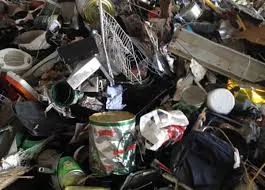

نويابىر . 12, 2024 18:30 Back to list
The Significance of Municipal Solid Waste Sorting Lines
In recent years, the world has faced a mounting challenge in dealing with municipal solid waste (MSW). With the exponential growth of urban populations, coupled with increased consumerism, cities are generating more waste than ever before. This growing volume of waste not only poses serious environmental threats but also hampers sustainable development efforts. One effective solution to this pressing issue is the implementation of municipal solid waste sorting lines, which play a critical role in waste management and recycling.
Municipal solid waste sorting lines are specialized systems designed to separate various types of waste materials for recycling and proper disposal. The sorting process typically involves a series of conveyor belts, shredders, and automated sorting technologies that work together to categorize waste into different streams. This separation allows for the efficient recovery of valuable resources, such as metals, plastics, paper, and organic materials. By diverting these materials from landfills, we can significantly reduce the environmental footprint associated with waste disposal.
The primary benefit of waste sorting lines is their ability to enhance recycling rates. While many municipalities have established recycling programs, the contamination of recyclable materials often limits the effectiveness of these initiatives. Waste sorting lines help mitigate this issue by removing non-recyclable contaminants before materials reach recycling facilities. This not only increases the quality of the recyclables but also ensures that more materials are suitable for processing, thereby boosting overall recycling rates and fostering a circular economy.
Moreover, municipal solid waste sorting lines contribute to resource recovery, which is essential for reducing the consumption of virgin materials. With finite natural resources becoming increasingly scarce, reclaiming materials from waste is more critical than ever. For instance, metals recovered from old electronics and appliances can be melted down and repurposed, reducing the need for mining new ores. Similarly, organic waste can be transformed into compost or bioenergy through anaerobic digestion processes, reducing the volume of waste sent to landfills and providing alternative energy sources.

The implementation of sorting lines also has significant economic benefits. By investing in advanced sorting technologies, municipalities can create jobs in the waste management and recycling sectors. These jobs range from sorting facility staff to engineers and technicians who maintain complex sorting equipment. Additionally, improved recycling rates can lead to cost savings for cities, as diverting waste from landfills can reduce disposal fees and extend the lifespan of existing landfill sites.
Furthermore, the establishment of municipal solid waste sorting lines can foster community awareness and participation in waste reduction efforts. As citizens become more educated about the sorting process and the importance of recycling, they are more likely to engage in waste-reduction behaviors. This increased community involvement can lead to a more sustainable future, where individuals and local businesses take responsibility for their waste and contribute to a healthier environment.
Despite the clear advantages, the deployment of municipal solid waste sorting lines is not without challenges. A significant initial investment is required to set up these systems, and ongoing maintenance can strain municipal budgets. Additionally, there is often resistance to change from both waste management authorities and the public, who may be accustomed to traditional waste disposal methods. Overcoming these hurdles calls for strong governmental support, public education campaigns, and the development of policies that encourage sustainable waste management practices.
In conclusion, municipal solid waste sorting lines represent a crucial tool in combating the growing issue of municipal solid waste. By improving recycling rates, enhancing resource recovery, providing economic benefits, and promoting community involvement, these systems can pave the way for a more sustainable and environmentally friendly future. As cities continue to expand and waste generation increases, investing in innovative waste sorting technologies will be essential in creating resilient urban environments. It is time for municipalities worldwide to embrace these sorting lines as a key component of their waste management strategies for a greener planet.
Latest news
Troubleshooting Common Eddy Separator Problems
NewsJul.04,2025
The Role of Metal Recycling Plants in Circular Economy
NewsJul.04,2025
The Impact of Recycling Line Pickers on Waste Management Costs
NewsJul.04,2025
Safety Features Every Metal Shredder Should Have
NewsJul.04,2025
How Industrial Shredders Improve Waste Management Systems
NewsJul.04,2025
How Cable Granulators Contribute to Sustainable Recycling
NewsJul.04,2025